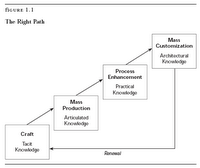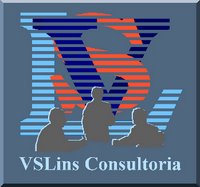New Ways to Work
 Let’s pause for a moment. Whereas tacit knowledge is the bedrock of craft, as firms gain experience with work under craft, additional learning occurs. This isn’t just craft workers becoming better craft workers.
Let’s pause for a moment. Whereas tacit knowledge is the bedrock of craft, as firms gain experience with work under craft, additional learning occurs. This isn’t just craft workers becoming better craft workers. A new type of knowledge, an important by-product of craft work, is generated: articulated knowledge. Leveraging articulated knowledge can propel a firm toward mass production.
Ignoring it (intentionally or not) means that a firm will remain in craft work. We see this pattern again and again on the right path.
One type of knowledge is the foundation for each of the four types of work. This foundation knowledge has to be managed for a firm to excel, be it in craft, mass production, process enhancement, or mass customization. Under each type of work, learning occurs and a by-product of work is generated: additional learning and knowledge, the key ingredients for firms taking the right path.
As firms capture and codify the by-product of articulated knowledge generated under craft, the story of the right path unfolds. We call the activities underlying the codification of articulated knowledge the development transformation, and it leads to mass production work.
Through development, a firm gleans, then begins to reuse the best ways to do the work. Development, in short, is a transformation that mines the rich veins if articulated knowledge and builds a machine like organization that mass-produces.
Using tools such as time and motion studies, process engineering, and automation, development captures the best approaches discovered in craft and applies them across the company.
Development instills discipline through processes, procedures, or automation so that work can be replicated anywhere, at any time, in any amount. Mass production is characterized by repeatable tasks, hierarchical control systems, functional structures, standardized routines and processes, automation, and division of labor.
Invented Here: Maximizing Your Organization’s Internal Growth and Profitability
Bart Victor
Andrew C. Boynton
harvard business school press
Boston, Massachusetts
Bart Victor
Andrew C. Boynton
harvard business school press
Boston, Massachusetts


<< Home